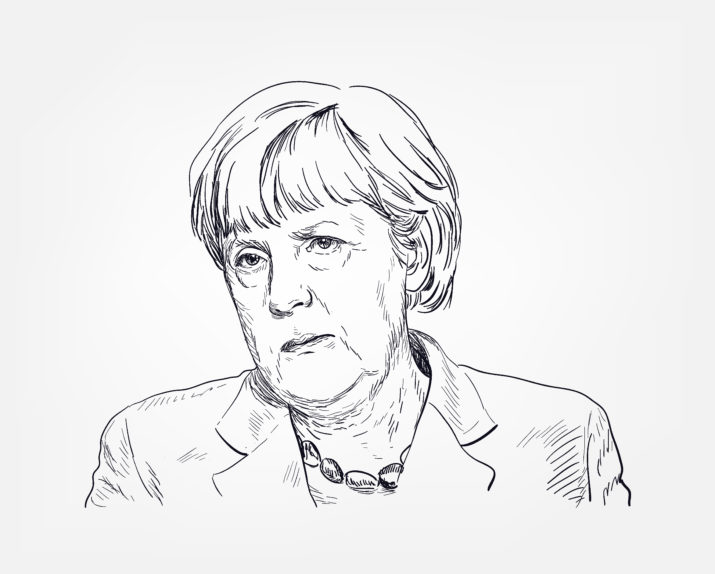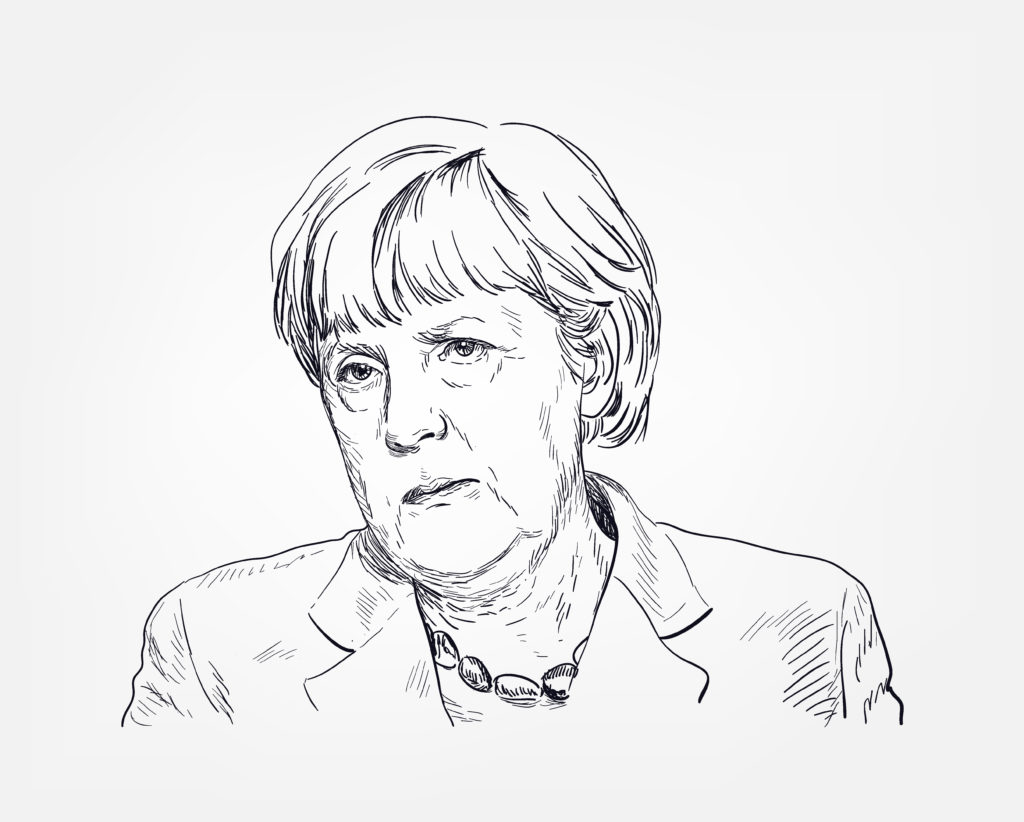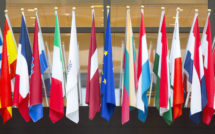

Coalition Collapse
Martin Schulz went head-on against Angela Merkel: the German chancellor was a “vacuum cleaner of ideas,” sucking up the programmatic core of other parties and selling it as her own whenever public opinion polling promises a profit; her “systematic refusal of politics” was responsible for the rise of right-wing Alternative für Deutschland (AfD); her election campaign nothing short of “scandalous.” The problem with Schulz’s fierce attack: it came too late. After an at best unfortunate, mostly timid, occasionally even narcotic campaign, Schulz, chairman and chancellor candidate of the Social Democratic Party of Germany (SPD), launched his attack on election night in late September 2017. It was right after his party had achieved its worst results since the founding of the Federal Republic in 1949, dropping to a miserable 20.5 percent.
The consequences to be drawn from this electoral disaster seemed evident to Schulz: a categorical “no” to a renewal of the “grand coalition” government with Merkel’s center-right Christian Democrats (CDU/CSU) that had been governing the country for the past four years (as well as from 2005 to 2009). And this principled refusal was grounded not only in the narrow interests of his own defeated party, but it would serve the larger purpose of defending German democracy writ large, Schulz insisted. For on the far right, the Alternative für Deutschland triumphantly entered the Bundestag for the first time, just a few percentage points behind the SPD, proclaiming, on election night, that it would, “hunt down Ms. Merkel, or whoever, and reclaim our country and our people [Volk].”[1] Denying the AfD the rank of opposition leader by taking it on themselves, the Social Democrats would assume the heroic role of a passionate, yet democratic agonist of the new government coalition under Merkel’s leadership, uniting CDU/CSU, the Liberal Democrats (FDP), and the Green Party. Merkel’s style of government, often described as anti-visionary, non-committal, reactive, and maybe best encapsulated in her repeated invocation of the word “alternative-less” [alternativlos], would, finally, be met with resistance.
Six months later. On March 4, 2018, SPD members voted to enter a grand parliamentary coalition—with Angela Merkel as chancellor. It was Schulz who had been leading the negotiations after the failure of coalition talks between CDU/CSU, FDP, and the Greens in November 2017. President Steinmeier had urged him not to renege on his “national [staatspolitische] responsibility” by forcing Merkel into a minority government or snap elections. In a statesmanlike pose, Schulz and his party complied with the President’s admonition, in denial of their own conviction that just continuing to be the hardly distinguishable junior partner of a social-democratized CDU would lead the party further into the abyss.
The price the party will have to pay for this wavering course could be hefty. Similar to the freefall of their center-left counterparts across Europe, support for the Social Democrats, for whom in 2002 a result of 38.5 percent had been a mild disappointment, has dropped significantly below 20 percent in recent polls. One poll even listed the AfD in second position and thus ahead of the decimated “people’s party” [Volkspartei].[2] Meanwhile, Schulz, hailed as the messianic figure set to salvage Social Democracy just a year ago, has turned out to be “a historical mistake” according to one of the party’s grandees.[3] After a farcical attempt to become Minister of Foreign Affairs in spite of his repeated pledge never to serve under Merkel, he was forced off the political stage altogether, clearing the way for Andrea Nahles to become the (designated) 8th party chair in 14 years – the first woman holding this position in the party’s 155-years-old history.
The Rise of the Right
With the SPD renewing the old coalition, the grim scenario Schulz painted on election night has now become reality: a far right-wing party has taken the role of the largest opposition group in the German parliament. This position carries not only considerable prestige but also comes with a few procedural perks, such as more speaking time, the chair in certain committees, or being the first to respond official government policy statements. Once founded by national-liberal academics and businessmen to oppose German Euro policies that they considered too lenient towards South European debtor states, the party soon began to capitalize on and further ignite the growing resentment toward migrants, and especially Muslims, after Merkel’s unilateral decision to open the country’s border to refugees in 2015. Rehearsing the well-known tropes of the nativist anti-establishment backlash across the globe, not least the attack on what they call the “lying press” [Lügenpresse], a term popular in the Nazi’s anti-Semitic propaganda against an alleged “Jewish conspiracy,” the AfD has been pursuing a strategy of calculated taboo breaks. These range from the party leader, Alexander Gauland, suggesting that the Commissioner for Immigration, Refugees, and Integration, Aydan Özoğuz, should “be disposed of in Anatolia”[4] to his deputy advocating the use of firearms against refugee families at the borders[5] and denouncing the use of Arabic by the Cologne police on Twitter as an attempt “to appease the barbaric, Muslim, rapist hordes of men.”[6] In an article in The Guardian, Timothy Garton Ash recently suggested that the AfD “makes Ukip look moderate, and Silvio Berlusconi seem like a distinguished conservative gentleman.”
Since they entered the hitherto dignified to dull Bundestag, debates there have certainly become more confrontational. Mocking laughter has become a standard reaction by AfD members when they think they have detected yet another instance of the unpatriotic (or ‘un-German’) cosmopolitanism they identify with the “old parties” [‘Altparteien’]. They shock with the excavation of vocabulary that not too long ago seemed to firmly belong to previous centuries and political regimes. They propose motions to deport refugees back to Syria and rail against the right of asylum as a “program to set up clan structures.” While no bigger scandal has erupted so far, the provocations hit hard. A CDU/CSU member of parliament even declared that the AfD’s behavior gives an impression of what it must have been like at the Kroll Opera House, the seat of the Nazi parliament after the Reichstag fire of 1933.[7] A resuscitation of the political indeed; but hardly of the kind Schulz must have had in mind when calling out Merkel on her merely managerial style of governing, in which he saw nothing short of an “assault on democracy.”
Centrist Failures
In Merkel’s own party, the CDU/CSU, resistance has started to stir as well. Amid the turmoil around the Social Democratic self-destruction, it has been almost overlooked that the CDU/CSU suffered a crushing defeat in the elections as well, going down from 41.5percent in 2013 to 32.9 percent in 2017, its worst result ever. Concurring with Schulze’s analysis, Merkel’s contenders blame the chancellor for giving up the party’s conservative profile for the sake of short-term electoral gains. Rather than sticking to CSU father figure Franz-Josef Strauss’s mantra that there should never be a democratic party right of the Christian Democratic Union, the “Merkel method” is said to have created a vacuum that the AfD filled only all too willingly. Even before the summer of 2015, her policies, from the introduction of a minimum wage to her defense of multiple citizenship and the phase-out of nuclear energy after a notoriously sudden change of opinion, indeed moved the party away from many of the classical tenets of Germany’s conservatives.
But during those years, prior to 2017, Merkel showed very few signs of weakness. This has changed, quite dramatically, with the elections. Political actors as well as analysts are not asking whether Merkel would run again for chancellor but only when during this term she would resign. With prophetic gesture, sociologist Wolfgang Streeck published a gloomy essay entitled “Merkel – a Retrospection” in the conservative Frankfurter Allgemeine Zeitung, a strikingly sharp reckoning with the chancellor’s reign from the perspective of a future historian.[8] Within the party, it is mostly young politicians under 50 who are leading the conservative challenge to Merkel and the preparations for the new era after her. Their most prominent representative is Jens Spahn, 37, an openly gay CDU MP, who has made his mark by siding with Austrian chancellor Sebastian Kurz in the refugee question and by catering to anti-Islamic resentment, describing himself as “burka-phobic” and calling for the state to force the “Arab muscle machos” at his local gym to shower naked.[9] In an attempt to both accommodate and discipline the growing discontent, Merkel promised him the health ministry, a notoriously complex and unrewarding post. Meanwhile, the CSU, the CDU’s traditionally more conservative Bavarian sister party, is openly embracing a right turn, trying to “close the right flank” as its chief Horst Seehofer put it.[10] A first symbolic step in that direction is the addition of the word Heimat to his Federal Ministry of Interior’s name, a peculiar German term whose romanticist excess cannot be captured by its common translation as ‘home’ or ‘homeland’. Alexander Dobrindt, until recently CSU transport minister, even called for a “conservative revolution,”[11] another term with rather uncanny historical connotations of the Weimar Republic movement associated with names such as Ernst Jünger, Martin Heidegger, or Oswald Spengler.
Schwarze Null
Fueling the Merkel-critical mood are the weak results the Christian union parties achieved in the coalition talks with the SPD. The coalition agreement is by and large a typical Merkel grand coalition product: many small reforms, ranging from labor market policies to rent regulation, with clearly Social Democratic leanings, garnished with only a few nods to the conservatives such as non-binding upper limit of 220,000 refugees entering the country per year.[12] All this would have been probably acceptable had the finance ministry not gone to the Social Democrats. The symbolic weight this loss carries for the Christian Democrats is hard to overestimate. Fiscal policy had become the great integrative force for a party that assured itself of its waning conservative identity by rallying behind ultra-conservative watchdog Wolfgang Schäuble in his quest for the “Schwarze Null.” Literally “black zero,” the term is the German metaphor for balanced budgets and constitutes something like the apogee of the mantra of “Alternativlosigkeit,” alternative-less-ness. Over the past decade or so, it has turned into the dogmatic objective of fiscal policy, possessing remarkable totemic forces that make otherwise fierce opponents gather around it. Under Schäuble’s tough guidance, and thanks to the country’s record-breaking economic prosperity, the budget was indeed balanced the last three years in a row. It says a lot about the Merkel years that this achievement can be considered one of the most emotional—and universally lauded—moments of her chancellorship, with the CDU launching a national campaign and website priding itself with this “historic success.”[13]
Budgetary success also provided a welcome opportunity for admonishing the heavily indebted Southern member states of the Eurozone. It became a standard trope in German political discourse to justify the troika’s (and quadriga’s) austerity policies by reference to Germany’s own “Schwarze Null.” If Germany was able to balance its budget, why would Portugal or Greece not be? Over the course of the Euro crisis, Schäuble became the conservatives’ darling once and for all, unrelenting, and often in opposition to Merkel, in his insistence on fiscal discipline and structural reforms in Greece and elsewhere. This appreciation was only furthered by his parallel rise to the rank of nemesis among the European left. With the Social Democratic takeover of the finance ministry, the CDU right sees Schäuble’s legacy in jeopardy—and with it the last remaining fortress of their conservative profile. Unsurprisingly, however, the “Schwarze Null” stands strong. Hence, right after his name was brought up as Schäuble’s successor, Olaf Scholz (not Martin Schulz) rushed to reiterate his commitment to a balanced budget in an interview with Der Spiegel.
A New Coalition and Eurozone Implications
At the European level, some have expressed their hope that the end of Schäuble also means the end of austerity. With control of the finance ministry passed to the SPD from the CDU and the foreign ministry remaining in their hands, their optimism (and, conversely, the conservatives’ pessimism) regarding a renewed debate about quadriga (formerly troika) policies may not be completely unfounded. While fiscally conservative at home, Scholz also stated in his Spiegel interview that he would have no interest in “dictating other European countries how they ought to develop [!],” an obvious dig at Schäuble. With the conclusion of the coalition negotiations, the SPD even proclaimed, “the end of the austerity mandate,” pointing out the passages in the coalition agreement that call for more money to fight the scourge of youth unemployment and promise greater contributions to the EU budget.
But apart from vague hints at making the Eurozone more resilient to crises and the project to develop the European Stability Mechanism into a European Monetary Fund, the agreement hardly makes any mention of the ongoing, structurally induced conflicts in the Eurozone. Despite its repeated insistence on Franco-German cooperation, it remains far behind French President Macron’s ambitious proposals to move the currency area closer towards a fiscal union. This aligns perfectly well with the coverage in the German media, where the issue has all but disappeared, quickly supplanted by the migration crisis once the latter had set on. Fundamental reforms anyhow seem almost impossible to sell to the German public for whom few expressions evoke greater horror than the allegedly imminent unconditional “communitization of debt.” Merkel, feeling the pressure mounting from her right, was quick to reassure those bemoaning the loss of the finance ministry that no decision regarding the Eurozone would be taken without her explicit consent. And in the background, Jens Weidmann, the latest representative of the honorable German tradition of ultra-hawkish central bankers who stands for everything the majority of Euro group does not want, is clutching at the presidency of the European Central Bank to be taken over from Mario Draghi in 2019. If no other major European country, most notably France, is willing to push the Euro issue back at the top of the agenda, southern hopes could quickly fade away.
Germany’s stance in the Euro crisis has been exemplary for its general unwillingness to reconsider its political role on the continent and beyond in a way that would do justice to its economic weight. At a time when even The Economist reprimands Germany for its massive current account surpluses and lack of spending,[14] the oh so proud (former) ‘export world champion’ shows no ambitions to adjust its self-absorbed economic model for the sake of a more stable world economy. That Germany continues to be in denial of the role it plays in the eyes of others became obvious when, after the Trump election, Angela Merkel was suddenly considered the ‘leader of free world.’ In response, Merkel relied on her well-known, time-proven strategy: she sat things out. Not surprisingly then, a collective sigh of relief could be sensed around Berlin when Emmanuel Macron all too willingly took that role out of Merkel’s hands quickly after his own election. It fits the picture that it took the SPD a long time to find someone willing and able to take over the Ministry of Foreign Affairs, and that recently nominated Heiko Maas can be considered a novice in the field of foreign policy. High-profile foreign affairs experts with political ambitions are rare these days in Germany, and with EU policy largely migrated to the chancellery and the finance ministry, the post seems to have lost a good deal of its appeal and clout. All that being said, the coalition agreement does signal, in fairly vague terms, that the new old government, in Macron’s wake, may be willing to commit new energies to the project of the European Union.
The title of the coalition agreement begins with “a New Departure for Europe.” It promises more German investments in the EU in a series of domains, from security to cultural policy. It stands to reason that it was indeed Martin Schulz, as former president of the European parliament, who pushed for giving Europe this central place. After his demission from all political tasks, the government seems to be short of personalities who could supplement, with their experience and political weight, what the coalition agreement lacks in concrete proposals for the future of Europe.
The renewal of the grand coalition has been welcomed with relief by the European establishment. Donald Tusk, President of the European Council, thus tweeted “German GroKo [for Große Koalition] is good news” immediately after the end of the negotiations. In unstable times, a stable Germany is all we can ask for—this seems to be the consensus. Meanwhile, in Germany, stability appears to many as standstill. Schulz’s attack on election night is exemplary for a renewed longing for politics as involving conflict and debate, rather than an anesthetized consensualism mixed with technocratic decisionism. But behind this post-narcotic sense of re-politicization lurks the demon of right-wing völkisch extremism that has propelled the AfD to opposition leader in the Bundestag. Germany has not been spared from the increasingly ponderous social cleavage that has brought us Trump, Brexit, PiS, and now MoVimento 5 Stelle and Lega Nord, but also Macron, pitting a mostly urban cosmopolitanism against national communitarism. The demise of the two old Volksparteien, SPD and CDU, calls their ability to counter those centrifugal forces into question. It must be feared that another four years of muddling through under a renewed grand coalition will further undermine this ability—and thus turn stability in the present into its opposite in the future.
Julian Jürgenmeyer is a PhD candidate and Paul F. Lazarsfeld Fellow in the Department of Sociology at Columbia University, currently based in Berlin. His work investigates the epistemic authority attributed to numbers in public, especially economic discourse as well as the everyday life of finance. He also serves as a contributing editor for Public Books.
Photo: Angela Merkel vector sketch illustration portrait | Shutterstock
References:
[1] Cf. the Tagesschau clip, https://www.youtube.com/watch?v=_fnja9qN2vM. Their notion of who belongs to the Volk and who does not, is of course not congruent with the electorate or all German citizens. It rather postulates an ethnically homogenous people, not yet corrupted by multiculturalism, globalism, the ‘memory cult,’ and similar evils, which has a purely symbolic rather than any empirical substance whatsoever. The AfD thus falls almost too smoothly under Jan-Werner Müller’s much-quoted definition of populism, cf. Jan-Werner Müller. 2016. What Is Populism? Philadelphia, PA: University of Pennsylvania Press.
[2] The term “Volkspartei”, traditionally referring to CDU and SPD, designates parties with a catch-all political program as against parties representing more narrow and clearly defined interests, such as the Greens or the Liberal Democrats.
[3] Interview with Klaus von Dohnanyi, “Martin Schulz war ein historischer Irrtum,” Deutschlandfunk, 15 February 2018, http://www.deutschlandfunk.de/spd-martin-schulz-war-ein-historischer-irrtum.694.de.html?dram:article_id=410797
[4] “AfD’s Alexander Gauland Slammed over ‘Racist’ Remark Aimed at Minister,” Deutsche Welle, 29 August 2017, http://www.dw.com/en/afds-alexander-gauland-slammed-over-racist-remark-aimed-at-minister/a-40277497
[5] “AfD-Vizechefin will Polizei sogar auf Kinder auf schießen lassen,“ Frankfurter Allgemeine Zeitung, 31 January, 2016, http://www.faz.net/aktuell/politik/fluechtlingskrise/beatrix-von-storch-afd-vizechefin-will-polizei-sogar-auf-kinder-schiessen-lassen-14044186.html
[6] Joseph Nasr, “Beatrix von Storch: German Police Accuse AfD Politician of Hate Incitement over Anti-Muslim Tweet,” Independent, 2 January 2018, http://www.independent.co.uk/news/world/europe/beatrix-von-storch-germany-afd-anti-muslim-twitter-north-rhine-westphalia-new-years-eve-a8138086.html
[7] Both quotes in Peter Dausend, “Mitten im Beben,“ Die ZEIT, 12 February, 2018, p. 6.
[8] Wolfgang Streeck, “Merkel. Ein Rückblick,“ Frankfurter Allgemeine Zeitung, 16 November 2017, p. 11, http://plus.faz.net/feuilleton/2017-11-16/merkel-ein-rueckblick/80165.html
[9] Interview with Jens Spahn, “Ein Verbot ist überfällig. Ich bin burkaphob,“ Welt, 30 July 2016,
https://www.welt.de/politik/deutschland/article157398148/Ein-Verbot-ist-ueberfaellig-Ich-bin-burkaphob.html
[10] https://global.handelsblatt.com/politics/five-signs-of-germanys-rightward-shift-831991
[11] Alexander Dobrindt, „Wir brauchen eine bürgerlich-konservative Wende,“ Welt, 4 January, 2018, https://www.welt.de/debatte/kommentare/article172133774/Warum-wir-nach-den-68ern-eine-buergerlich-konservative-Wende-brauchen.html
[12] The agreement can be found in German at: https://www.tagesschau.de/multimedia/koaltionsvertrag-101~_origin-787f511a-0a95-4a71-81a8-4869d1ec88a4.pdf
[13] For a helpful overview of the political history and economics of the ‘Schwarze Null’, see Lukas Haffert. 2016. Die Schwarze Null: Über die Schattenseiten ausgeglichener Haushalte. Berlin: Suhrkamp.
[14] See the July 2017 issue entitled “The German Problem,” especially “Why Germany’s current-account surplus is bad for the world economy. The country saves too much and spends too little,” www.economist.com/news/leaders/21724810-country-saves-too-much-and-spends-too-little-why-germanys-current-account-surplus-bad
Published on March 13, 2018.




